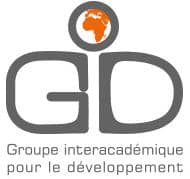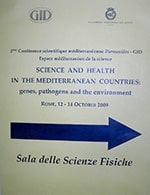
SCIENCE AND HEALTH IN THE MEDITERRANEAN COUNTRIES : genes, pathogens and the environment
ROUND TABLE DISCUSSIONS : FINAL REPORTS
GID : VISION IN THE MEDITERRANEAN AREA AND THE ROAD MAP FOR ACTIONS
| PREAMBLE | ||
|
During the course of history, the appearance and growth of different social organizations and political structures in the Countries of the Mediterranean Sea Basin contributed to the creation of the economical and cultural heterogeneity that nowadays characterize the region. This cultural and social heterogeneity heavily contrasts with the common genetic background of the populations living in the area ; this is a fundamental component at the origin of the common health problems shared by the different Countries and their health care systems. As widely accepted, it is the interplay between the genetic mak-up of an individual and the environment in its widest possible significance (life styles, pollution, pathogens, diet, …) that ultimately determines the health of individuals and populations. This has been the hallmark of the second GID Conference that focused on the identification of and the discussion about some of the fundamental and common factors responsible for the onset of disease and its consequences in terms of public health. Since many of the more common and devastating diseases are complex multi-genetic syndromes, the efforts of the scientific community should be to lay down a solid ground for the necessary simplification without drifting towards simplistic approximations : be as simple as possible but not beyond. Unfortunately it is nowadays very difficult if not impossible to quantify the whole burden of genetic and environmental components involved in the pathogenesis of the most common diseases among people of all ages living in the Mediterranean Sea Basin. An essential step in the right direction is the collection of proper epidemiological data vis-à-vis the assessment of life styles in each region. Starting from this demand, an agreement on improved, correct but manageable epidemiological protocols seems a condicio sine qua non to identify actions which can ensure enhancement of the quality of health and social progress of the people. |
||
GENETIC DISEASES
|
Chairpersons and Rapporteurs
Discussants
Background As outlined above, in spite of the common genetic background of the populations living in the Mediterranean area it is nowadays impossible to quantify the whole burden of genetic disease among people of all ages. This will require a detailed collection of genetic epidemiological data and the assessment of needs in the region. The improvement of Genetic Medicine is one essential component for the understanding of the pathophysiology of complex diseases. After the publication of the complete human genome sequence, the post-genomic era is driven by the need to extract useful information from genomic data. Genomics, transcriptomics, proteomics, metabolomics, and other –omics sciences, together with epidemiological data and familial history provide different angles to our understanding of gene-gene and gene-environment interactions and the determinants of disease and health. Genetic diseases represent a public health problem in most Mediterranean populations. For example, the persistence of consanguineous marriages in most Arab and Muslim societies leads to an increased morbidity and mortality among infants affected with autosomal recessive disorders and congenital malformations. Similarly, founder effects in Ashkenazi Jews increase the prevalence of different lysosomal storage disorders, including Tay-Sachs and Gaucher diseases. In addition, some social, cultural and religious behaviors contribute to the prevalence of genetic disorders. Government-based data on the prevalence of genetic diseases in the Mediterranean populations are hardly ever published, and specific public health programs do not exist except for a few exceptions (Qatar, Bahrain). In Lebanon, for example, the number of persons living with genetic diseases is estimated at 35,000 individuals in any given year. The majority of those diseases are so rare that they are often dubbed “orphan diseases” and are generally neglected in terms of etiological and therapeutic research as well as in medical and social support for those living with them. Our challenge is to integrate different types of data and intervention policies into a general model suitable for cooperation ; and equally important knowledge/data sharing on medical and social problems (related to the prevention of genetic diseases common among the local and migrant populations of the Mediterranean Sea Basin), through education, dissemination, training and scientific collaboration between physicians, scientists, health professionals, students and consumers. Visions There is a need for a globally competitive Mediterranean Research Area of excellence in Medical Genetics, to facilitate the advancement of science and to improve prevention, diagnosis and care of genetic diseases. This requires : A stimulating education system in genetic medicine, including genetic epidemiology, genetic counseling, genetic testing and when appropriate genetic screening. Open access to the output of publicly funded research and permanent access to primary quality-assured research data. Effective and trusted bridges between science, society and the private sector, donors, charities, small and medium enterprises. Transnational funding, benchmarking of quality and shared scientific priorities for strategic research and researcher-driven programmes. Openness to the world. Actions The vision above, requires actions by different actors including Universities, the Academies, the Governments and the private sector. GID and its Member Organisations may share this responsibility by contributing to the construction of an appropriate strategy, and will initiate the following actions : To create a Euro-Mediterranean structured work space for dialogue, cooperation and information exchange, as well as training in the field of Genetic Medicine.
To strengthen the relationships between genetics and society through the dialogue between research organizations and political actors at the Mediterranean level in cooperation with national and international scientific societies.
To implement a common policy on Open Access to research results and Permanent Access to the technological platforms and to the Observatory data by specifically :
To connect Mediterranean research to the world by : Streamlining collaboration between research groups and GID Member Organisations with other Europeans and non-European counterparts ;
These four strategic actions will be further elaborated in the next future, identifying the main effects, the actors concerned and the resources required. Some actions are already quite concrete and committing, others require more preparation and study. The priority setting will be decided by the Member Organisations through their interaction with Governments and might change in the course of the process. |
HEREDITARY AND ENVIRONMENTAL FACTORS
IN CHRONIC DISEASES
|
Chairpersons and Rapporteurs
Discussants
Background The topics discussed in the relevant Symposium 2 have dealt only partially with the whole set of great killers that come under the chapter of chronic diseases, including not only cancer and immunological disorders, but obviously diabetes, cardiovascular and cerebrovascular diseases, and more. The burden of cardiovascular diseases (juvenile myocardial infarction, stroke, heart failure and cardio-myopathies) is enormous ; in the Mediterranean area these are the main cause of morbidity and mortality, including sudden death, as well as gross expenditure for the national health Organizations. The genetic basis of these chronic syndromes is known to be complex and very difficult to disentangle. Over-and-above the medical genetics aspects, these diseases are well known for being heavily affected in their manifestation and severity by environmental factors sensu lato ; just consider the role of smoking in causing the somatic mutations leading to lung cancer ; that of metabolic disorders in cardiovascular diseases ; or the complex immunological responses involved in the increasing incidence of autoimmune diseases. Therefore the syndromes falling under this category are almost always dependent on the interplay between the genetic make-up of the individual and the different components of the quickly changing life style, indeed the focus of this Conference. Visions Among the various contributing factors that have affected dramatically health deterioration, a critical role is to be attributed to the abrupt increase in the spread of well known risk factors (smoking, diabetes, arterial hypertension, obesity,…), sometimes with a very fast change in life-style. Since these affect the emergence and spread of chronic illnesses, their evaluation should be of prime concern. This scenario should prompt efforts to implement effective and widespread educational programs, in order to reverse or at least slow down this trend. The knowledge of the diverse demographic and socio-economic backgrounds, side by side to the epidemiology of the main causes of morbidity and mortality in the participating Countries of the Mediterranean area, is essential for implementing new programs for research and health care. In this perspective, the creation of a network of Centers that should cooperate through different research plans, and implementation of effective and widespread educational programs in order to reverse the negative trend in life-style habits, are considered essential in fighting these great killers. Actions The brief summary outlined above should call for action by different institutions including Universities, Academies, Governmental Agencies and the private sector. GID and its Member Organisations could contribute by proposing appropriate strategies to reverse negative trends : Education
Epidemiology
Centers of excellence and collaboration
|
EPIDEMIOLOGY OF INFECTIOUS AND EMERGING DISEASES
|
Chairpersons and Rapporteurs
Discussants
Background The impressive health achievements in the control of infectious diseases and consequent increase in healthy life expectancy gained during the past century through hygiene, antibiotics and vaccines are severely threatened by infectious disease emergences and re-emergences, amplified by environmental changes, globalization of commerce, travel, and people migration. This threat demands rapid and converging actions. Infectious diseases have no borders in a global world, and can be fought only by integrated, multidisciplinary approaches. Mediterranean Countries do not make an exception to the above trend. Extensive exchange of goods, food, animals, coupled with travel and emigration from poor and politically fragile Countries to well off Countries of Southern Europe is expected to be on the rise across the board, and should be of concern to the European Union. All of the above constitutes a driving force for importation and spreading of old and new infectious agents and their vectors / vehicles. There is clearly unequal distribution of capacities, competences, human resources and organizational infrastructures to successfully fight the threat of infectious diseases in the Mediterranean Area. There is public recognition of the prestige and independence of the Academies. Actions The participants unanimously recommend several priority actions to be taken by the Academies of Mediterranean Countries, in cooperation with Public Health Institutions such as WHO and ECDC to improve preparedness and response to infectious diseases threat to a level approaching as closely as possible equality among the different Countries. Particularly, these actions should identify and implement tools and procedures for :
Conclusion For the success of the actions above, the Plenum recommends the creation of a network of Representatives (Focal Points) from Academies and Public Health Institutions of the Mediterranean Countries as a new vehicle to promote, implement and verify the outcome of all actions. This network should work in collaboration with existing organizations sharing similar objective in a larger context (e.g. WHO, ECDC, etc), particularly with those already created with reference to Mediterranean Countries (e.g. Epi-South and others having similar missions). |




